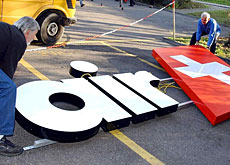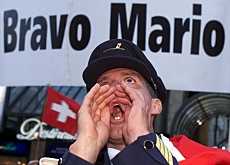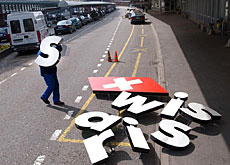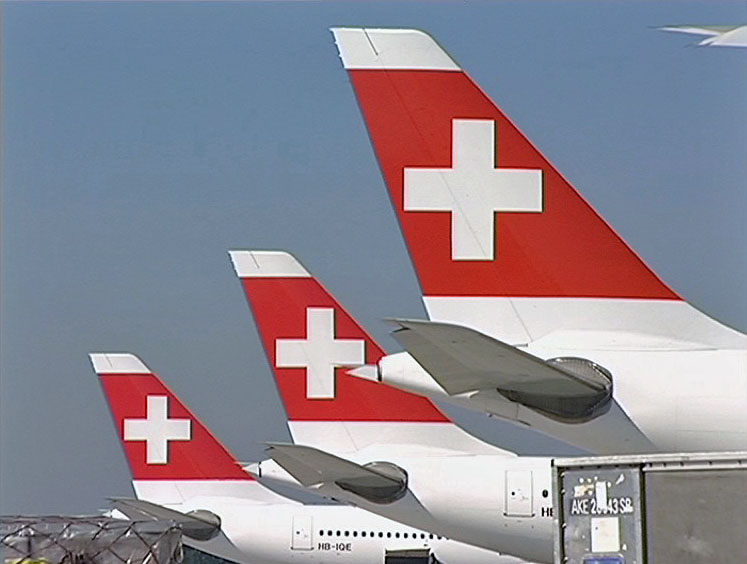Schmidheiny breaks Swissair silence

The first week of the Swissair trial of former board members and top managers draws to a close with executive Gaudenz Stähelin appearing in court on Friday.
On Thursday Thomas Schmidheiny – one of 19 former top executives and board members on trial over the collapse of the former national carrier – spoke out, unlike five previous defendants who had all refused to testify. Stähelin also maintained his silence.
“I recognize nothing from this bill of indictment,” Schmidheiny, a former Swissair executive board member, told the three-judge panel during the third day of the trial in Zurich.
Schmidheiny defended the work of the SAirGroup’s executive board, Swissair’s parent group, which was made up of 270 different companies.
The industrialist, who was a board member from 1980 to 2001, claimed that the Swissair board had always discussed the risks and checked the suitability of its “hunter strategy” pursued during the 1990s.
The failed strategy, which involved buying minority shares in a number of smaller airlines, including Belgium’s Sabena, Italy’s Volare, France’s Air Littoral and AOM, Germany’s LTU, Poland’s LOT and Portugal’s TAP, contributed to its demise.
Not all buy-out proposals put forward by Philippe Bruggisser, the head of SAirGroup, were accepted by the board, he said.
At the same time, SAirGroup had access to sufficient securities via the possible sale of profitable companies Nuance and Gate Gourmet, which would have freed up SFr3 billion ($2.4 billion).
“In 2000 neither SAirLines, nor SAirGroup were heavily in debt,” he said. “I challenge the evaluations made by the prosecution.”
Schmidheiny argued that this dual track approach – “hunter strategy” and financial guarantees through profitable companies – had worked.
Belgian threats
Schmidheiny criticized the government of Belgium for pressuring Swissair into making a €150-million payment to buy a stake in carrier Sabena or risk jeopardizing trade liberalization agreements between neutral Switzerland and the European Union.
He blamed the global slump in the travel industry after the September 11, 2001 attacks on the United States for the airline’s demise.
Verena Spoerry, also a former Swissair board member and a prominent politician, also proclaimed her innocence but – like the four previous defendants – refused to testify when she appeared before the court on Thursday morning.
The Swiss flag carrier, once a symbol of reliability and national pride, was abruptly grounded on October 2, 2001, after many months of financial problems, stranding tens of thousands of passengers worldwide. The case against the former administration has been described as the country’s biggest-ever corporate trial.
Thousands of employees and shareholders lost their life savings in the airline’s collapse, and the country’s four main political parties have demanded that former executives be held responsible.
The entire managerial board faces charges that include damaging creditors, mismanagement, making false statements about the business and forging documents. The trial is expected to run until March 9.
swissinfo with agencies
Swissair planes were grounded in October 2001, after the company had been in business for 71 years.
The downturn in the aviation market after the terrorist attacks of September 11, 2001, proved the last straw for the heavily indebted Swissair, which folded the following year.
The airline collapsed because it over-extended itself by buying stakes in numerous loss-making airlines, including Belgium’s Sabena and Poland’s Lot, in an attempt to form its own airline alliance.
Swissair left behind debts to the tune of SFr17 billion ($13.7 billion) and resulted in 5,000 job losses.
The remains of Swissair and the regional carrier Crossair were brought together in 2002 to form the new national carrier Swiss, which was in turn taken over by Germany’s Lufthansa in 2005.
There are 19 defendants, including 16 former members of the Swissair board and the company’s top management.
The trial is expected to last eight weeks; no date for the verdict has been set.
The investigation took five years and produced 280 metres worth of documents.
The prosecution’s indictment is a 100-page document.

In compliance with the JTI standards
More: SWI swissinfo.ch certified by the Journalism Trust Initiative





You can find an overview of ongoing debates with our journalists here . Please join us!
If you want to start a conversation about a topic raised in this article or want to report factual errors, email us at english@swissinfo.ch.